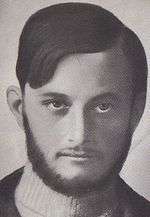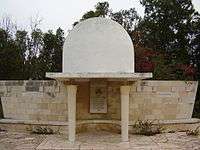Avshalom Feinberg
| Doctor Avshalom Feinberg | |
|---|---|
 | |
| Born |
23 October 1889 Gedera, Ottoman Empire, (now Israel) |
| Died |
20 January 1917 (aged 27) near Rafah, Ottoman Empire, (now Gaza Strip) |
| Children | None |

Avshalom Feinberg (Hebrew: אבשלום פיינברג, October 23, 1889 – January 20, 1917) was one of the leaders of Nili, a Jewish spy network in Ottoman Palestine helping the British fight the Ottoman Empire during World War I.
Feinberg was born in Gedera, Palestine, then part of the Ottoman Empire, and studied in France.[1] He returned to work with Aaron Aaronsohn at the agronomy research station in Atlit. Soon after the beginning of war, the four Aaronsohn siblings (Sarah Aaronsohn, Rivka, Alex, and Aaron) founded the Nili underground along with Feinberg. They were later joined by Yosef Lishansky and others. In 1915 Feinberg travelled to Egypt and made contact with British Naval Intelligence. In 1917, Feinberg again journeyed to Egypt, on foot. He was apparently killed on his way back by a group of Bedouins near the British front in Sinai, close to Rafah.[2] His fate was unknown until after the 1967 Six-Day War when his remains were found under a palm tree that had grown from date seeds in his pocket to mark the spot where he lay.[3]
In 1979 a new Israeli settlement in the Sinai Peninsula, Avshalom, was named after him. Although it was abandoned in 1982 following the Camp David Accords, a new village by the same name was founded in Israel in 1990.
Further reading
- Ot me-Avshalom by Nava Macmel-Atir, 2009 (Hebrew). ISBN 978-965-482-889-5
References
- ↑ Engle, Anita (1959). The Nili Spies. London: The Hogarth Press. pp. 30–32.
- ↑ Katz, Shmuel (2007). The Aaronsohn Saga. Jerusalem: Gefen. pp. 144–145. ISBN 978-965-229-416-6.
- ↑ Birnbaum, Ervin (1990). In The Shadow Of The Struggle. Jerusalem: Gefen. p. 73. ISBN 978-9652290373.
External links
- Avshalom Feinberg Zionism-Israel
- Letters written by Avshalom Feinberg at Project Ben-Yehuda (Hebrew)
| Wikimedia Commons has media related to Avshalom Feinberg. |